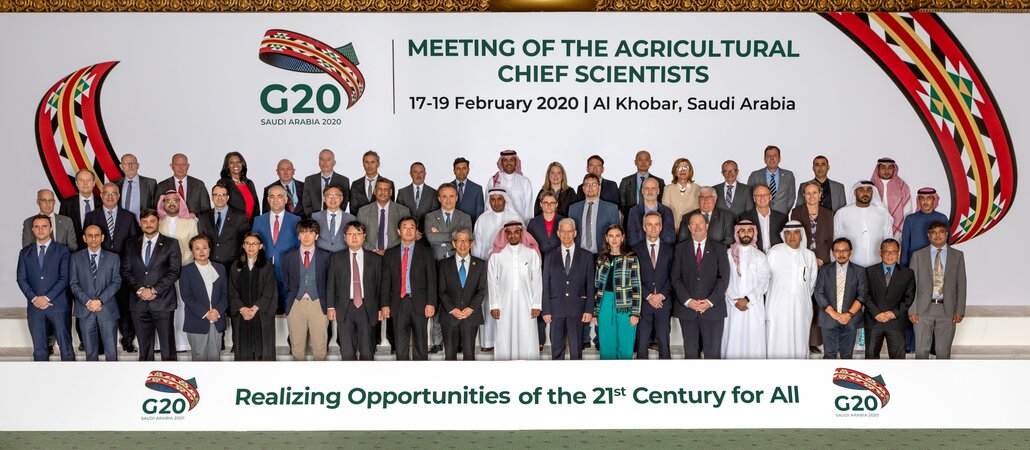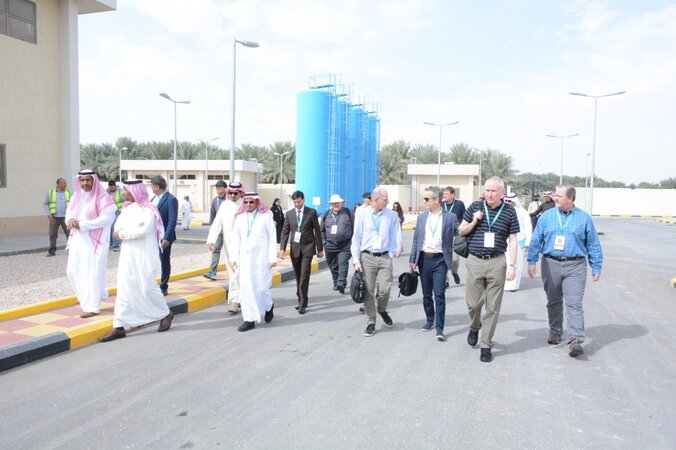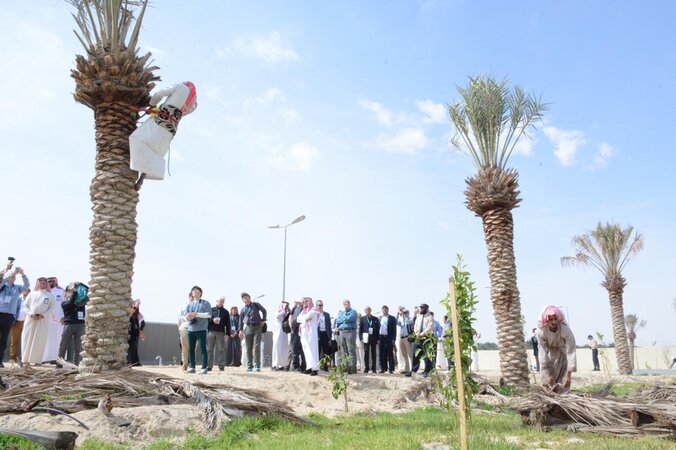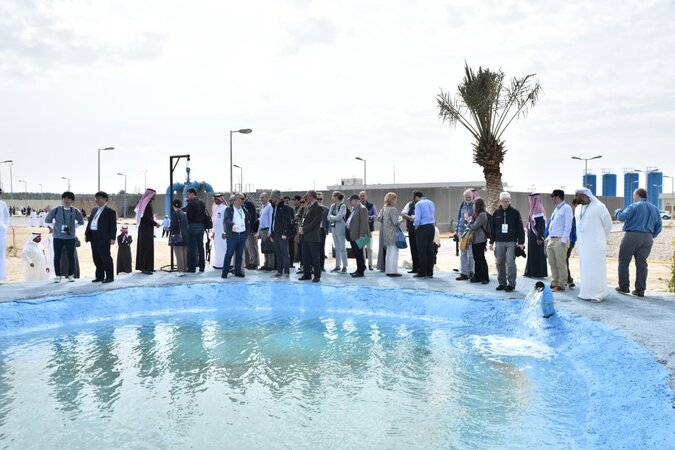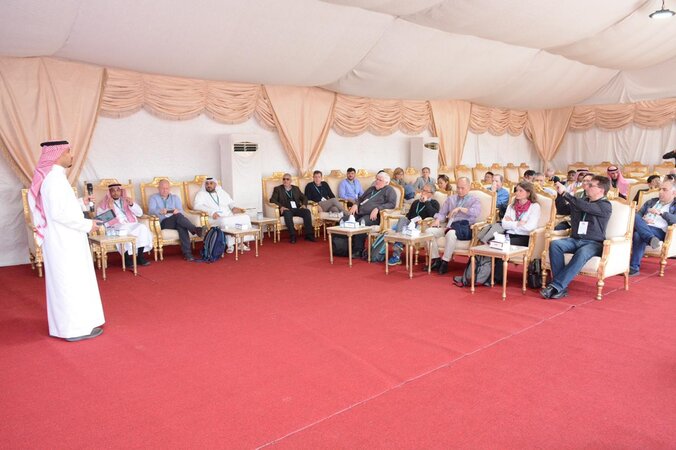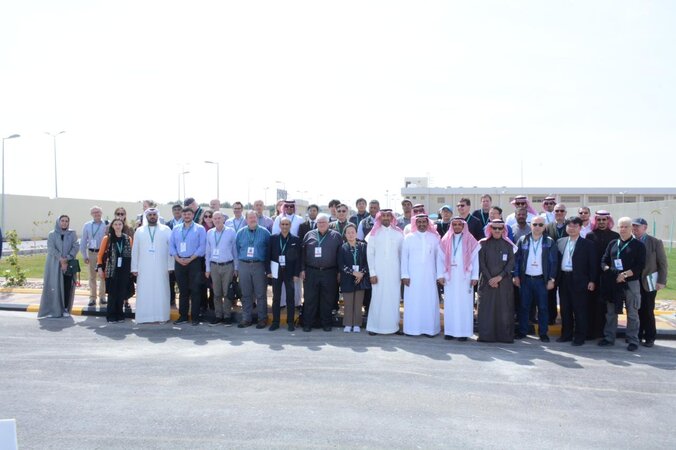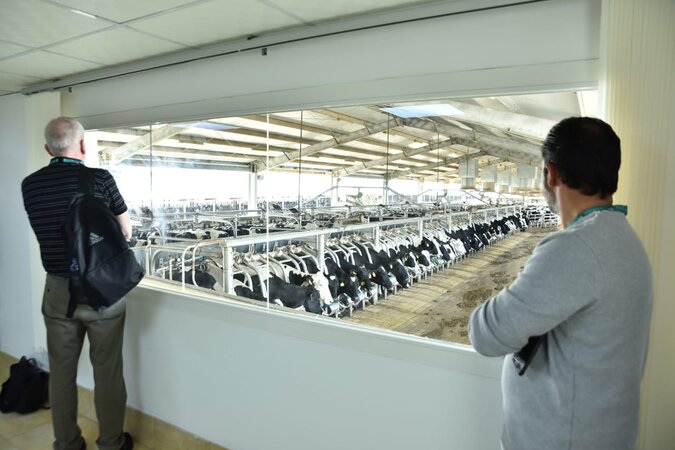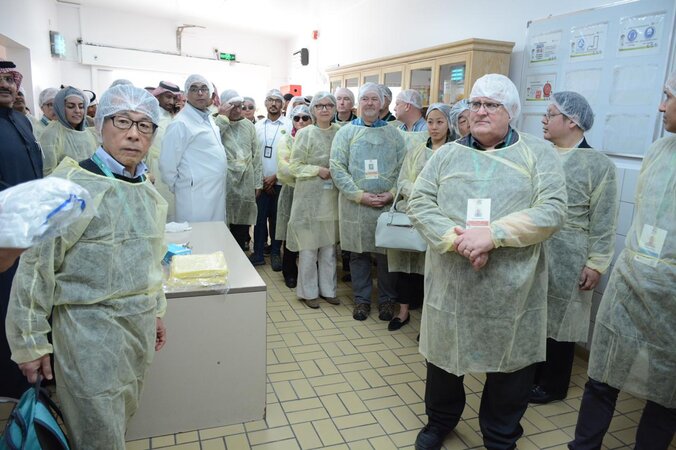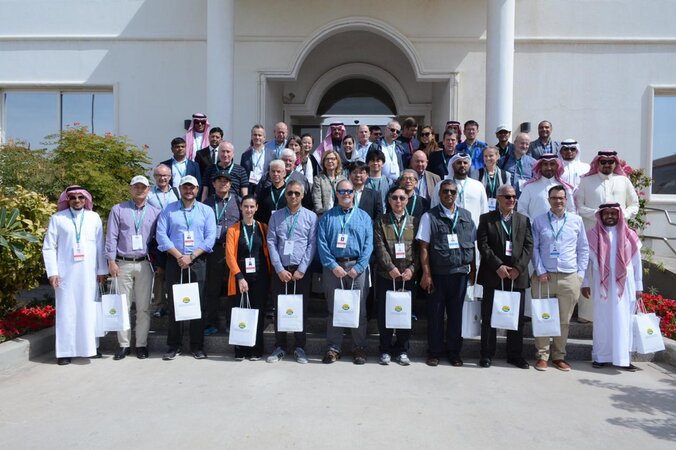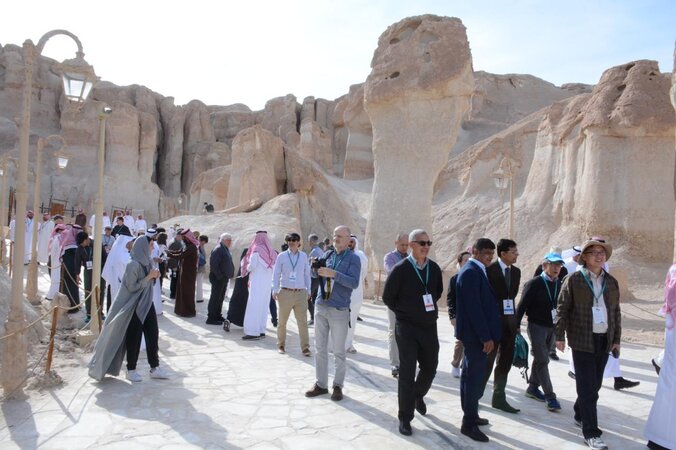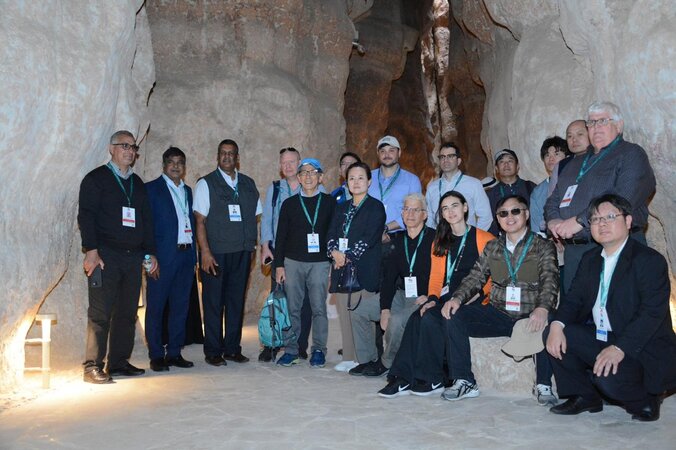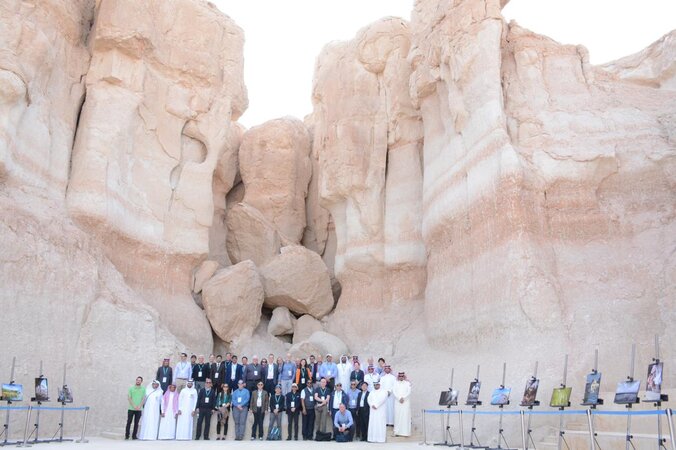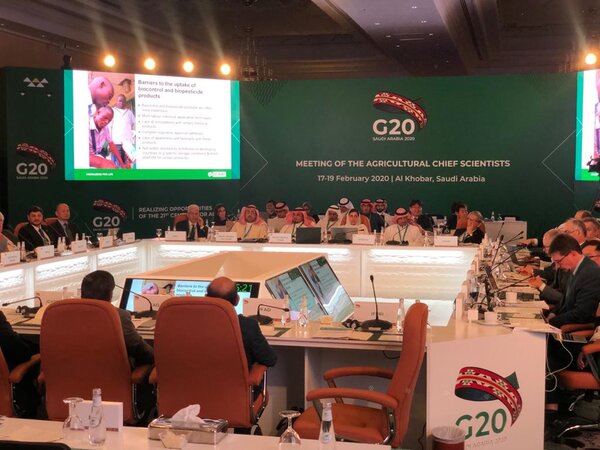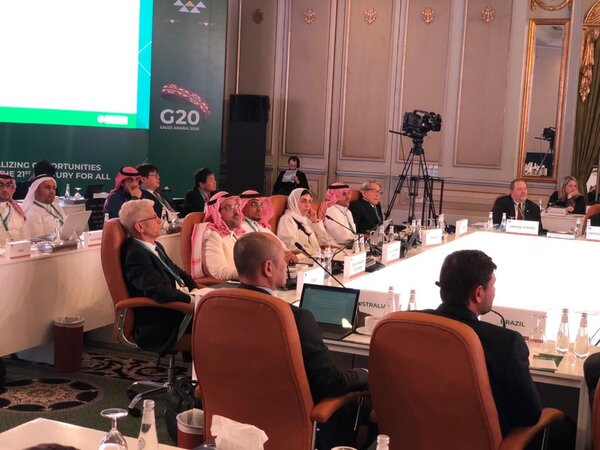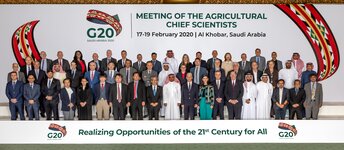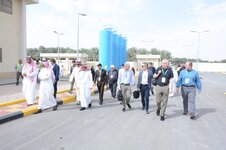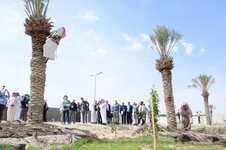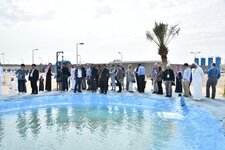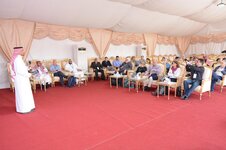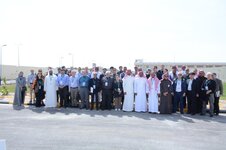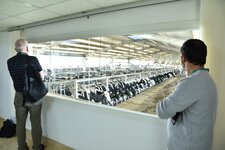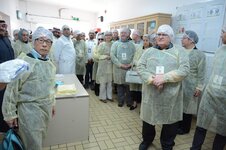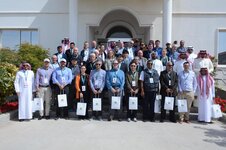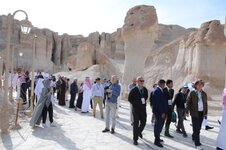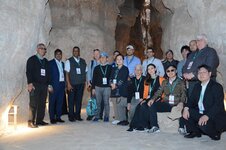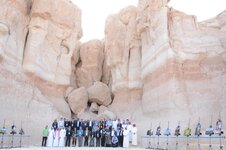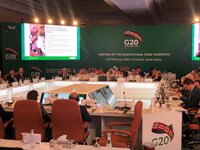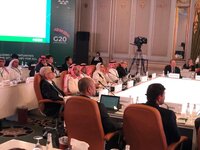Saudi Arabia 2020
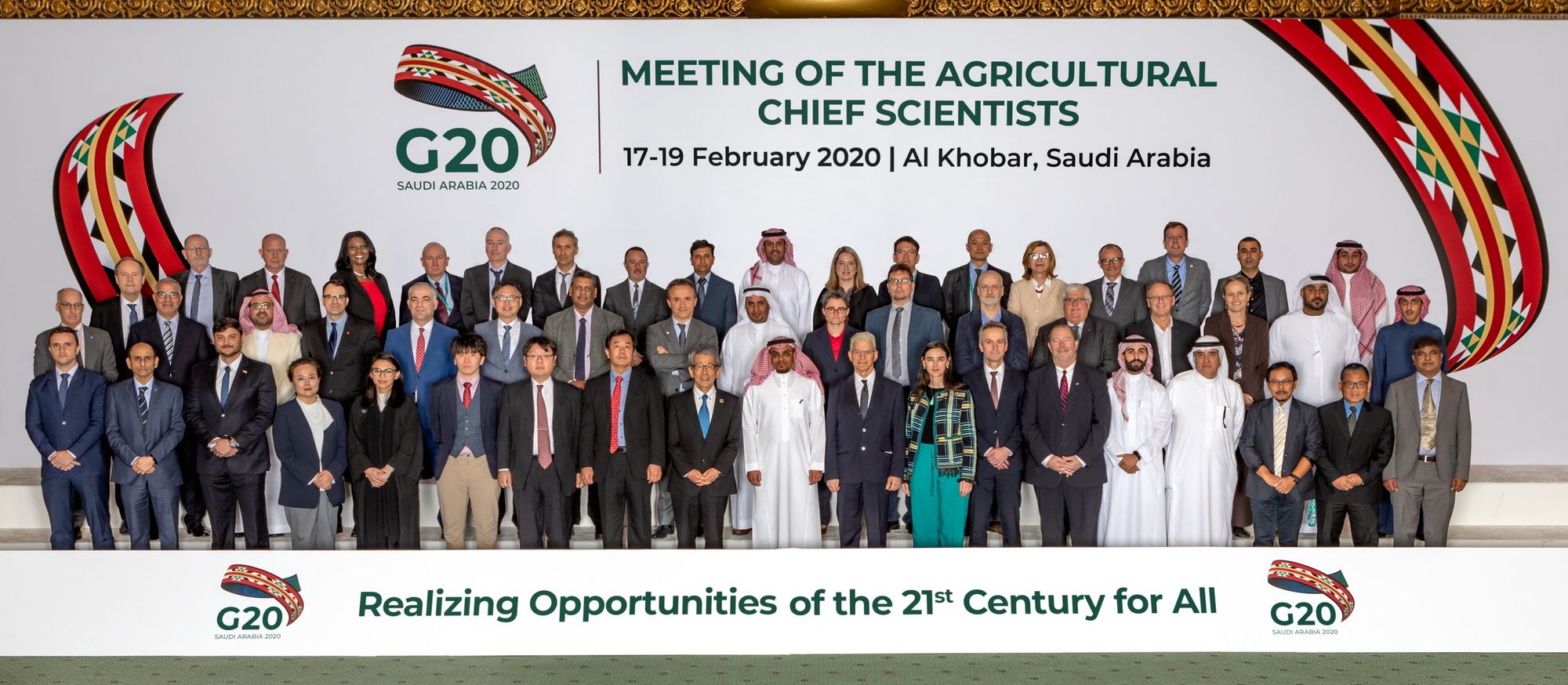
The city of Al-Khobar hosted the ninth Meeting of the G20 Agricultural Chief Scientists (MACS) chaired by Kingdom of Saudi Arabia as G20 President on 18th and 19th February 2020 with 65 participants from G20 members, guest countries, and international organizations. Key global issues covered by the meeting included sustainable agriculture development in drylands, promoting agricultural productivity and sustainability through a wide range of innovative approaches including cutting-edge technologies, and the Water, Energy and Food (WEF) nexus. MACS members recognized the need to co-create tailor made approaches, adapted to the local needs of farmers, rural communities, value chains and consumers.
Prior to the meeting, a field trip to Al-Hassa Oasis was organized on 17th February 2020. The participants visited: Saudi Irrigation Organization (SIO) to observe irrigation maintenance and management activities; herd and production factory of Nada Dairy Company; and Land of Civilizations (Al-Qara Mountain) one of the most prominent natural tourist attraction in the Kingdom of Saudi Arabia.
Downloads
- Communiqué
- List of participants
- Agenda
- Annotated Agenda
- Stocktaking
- Concept Paper: Promoting Sustainable Development through Innovative Cutting-edge Agricultural Technologies for Increased Production
- Concept Paper: Sustainable Agriculture Development in Drylands
- Concept Paper: Water Energy Food Nexus to Curtail Future Food Uncertainties
- Final Report on the “International Workshop on Scaling up and out of Climate-smart Technologies and Practices for Sustainable Agriculture”
- Final Report on the “International Workshop on Facilitating International Research Collaboration on Transboundary Plant Pests”
- Guiding principles
Presentations
- G20-MACS in Japan, 2019
- G20 MACS Task Force
- International Workshop on “Facilitating International Research Collaboration on Transboundary Plant Pests”
- Activities deduced from MACS-G20 Collaboration Initiative on Food Losses & Waste
- International Workshop on “Scaling up and out of climate-smart technologies and practicesfor sustainable agriculture”
- Discussion questions stocktaking
- Sustainable Agriculture Development in Drylands
- DryArc: a framework for a Sustainable Transformation of Dryland Agri-food systems under Climate Change
- Sustainable Agriculture Development in Drylands in the Arab Region
- Sustainable agriculture in the drylands
- Discussion questions drylands
- Promoting Sustainable Development through Innovative Cutting-edge Agricultural Technologies for Increased Production
- Digital agriculture: from technologies to food systems changes
- Empowering advisory services andgrowersby providing free access to innovative digitaldecision supporttools
- Unlocking the potential of agricultural innovation to achieve sustainable development goals
- Discussion questions agritech
- Water Energy Food Nexus to Curtail Future Food Uncertainties
- Land, a critical resource for the water, energy and food nexus
- The Water-Food-Energy Nexus
- Managing complexity for sustainability: Experience from governance of water-food-energy nexus
- Discussion questions water-food-energy nexus
- MACS 2021 - Italy
Activities
International Virtual Experts Meeting on Promoting Sustainable Agriculture Development in Drylands
Riyadh, Kingdom of Saudi Arabia 10th August 2020
TIME | Session | presenter | Duration |
14:00 – 14:05 | OPENING SESSION (5 min) | ||
| 1. Welcoming Address (Kingdom of Saudi Arabia) | Prof. Suliman Ali Al-Khateeb | 3 min |
14:05 – 14:40 | Session 1. Key Risks, opportunities and system approach for sustainable agricultural development In drylands (35 min) | ||
| 1. Systems agronomy in northern Australia's maturing agriculture | Dr. David Lawrence (Australia) | 7 min |
| Prof. Wang Yaosheng (China) | 7 min | |
| 3. Modelling dry farming systems: a roadmap for tool development | Dr. Marcello Donatelli (Italy) | 7 min |
| Dr. Mohammad Almutari (Kingdom of Saudi Arabia) | 7 min | |
| Dr. Laura Schreeg (USA) | 7 min | |
14:40 – 16:05 | Session 2. Enabling tools for sustainable agricultural development In drylands (85 min) | ||
| 1. Genome editing for drought tolerance and crop production sustainability | Dr. Sergio Feingold (Argentina) | 7 min |
| Dr. Myriam Adam (France) | 7 min | |
| 3. Enhancing drought stress tolerance by harnessing genetic resources | Dr. GwendolinWehner (Germany) | 7 min |
| Dr. D.K. Yadava (India) | 7 min | |
| 5. Developing drought-tolerant legume crops by agro-ecological and genomic approaches | Dr. Paolo Annicchiarico & Dr. Luciano Pecetti (Italy) | 7 min |
| 6. Drought tolerance improvement in plants: An integrated view from breeding to genomics | Mr. Enes YAKIŞIR (Turkey) | 7 min |
| 7. Agricultural transformation in the drylands: Role of Data & Disruptive technologies | Prof. Wayne Powell (UK) | 7 min |
| 8. Crop breeding for drought-resistance varieties using smart sensors | Dr. Shamal Mohammed (UK) | 7 min |
| 9. Appropriate Technologies for Soil and Water Management: South African Examples | Prof. Sue Walker (South Africa) | 7 min |
| Mr. Konstantin Romanenko (Russia) | 7 min | |
| 11. Soil & water researches in adaptation to climate change: Turkey Case | Mr. Alican EREN (Turkey) | 7 min |
| 12. Irrigation in Canada: Improving water productivity through Research and Development | Mr. Evan Derdall (Canada) | 7 min |
16:05 – 16:25 | Session 3. biotic factors affecting sustainable agricultural development In drylands (20 min) | ||
| 1. Emerging biotic stresses affecting crops and animals and their management under drylands | Dr. N. Bakthavatsalam (India) | 7 min |
| 2. Pests & Diseases Challenging Animal’s Health in Drylands: ARC-OVR Perspectives | Dr. Mohammed Sirdar (South Africa) | 7 min |
| Dr. Ulrich Kuhlmann & Dr. Belinda Luke (CABI) | 7 min | |
16:25 – 17:35 | session 4. innovation, technology & adoption to enhance resource use efficiency (70 min) | ||
| Dr. Julia García (Argentina) | 7 min | |
| 2. Australian rangelands – Towards resilient systems under climate change | Dr. Cécile Godde (Australia) | 7 min |
| 3. Integrated systems in Brazilian semi-arid: tools for adapting to climate change | Dr. Diana Signor Deon (Brazil) | 7 min |
| Dr. Sylvie Morardet (France) | 7 min | |
| Prof. GeroldRahmann (Germany) | 7 min | |
| Mr. David Enríquez (Mexico) | 7 min | |
| 7. Scenarios for climate smart livestock systems in drylands | Dr. Henning Steinfeld (FAO) | 7 min |
| Mr. RachidSerraj and Ms. Vera Boerger (FAO) | 7 min | |
| 9. Integrating and scaling innovations for dryland agriculture | Prof. Jacques Wery (ICARDA) | 7 min |
| 10. High and Low tech innovations to enhance resilience of small scale farmers | Mr. Shantanu Mathur (IFAD) | 7 min |
17:35 – 18:25 | Discussion |
| 50 min |
18:25 – 18:30 | closing session (5 min) | ||
| Closing Remarks |
| 5 min |
Final Report
To reach the Final Report (click here)
International Virtual Workshop on Water, Energy, Food Nexus
Riyadh, Kingdom of Saudi Arabia 31st August 2020
TIME | Session | presenter | Duration |
14:00 – 14:05 | OPENING SESSION (5 min) | ||
| 1. Welcoming Address (Kingdom of Saudi Arabia) | Prof. Suliman Ali Al-Khateeb | 5 min |
14:05 – 15:30 | Session 1. Nature-based and science-based solutions to protect ecosystems and enhance resource use efficiency for sustainable food system at a global scale (85 min) | ||
| Prof. Gong Daozhi, (China) | 10 min | |
| 2. Connecting the Brazilian Agriculture to Ecosystem Services and Nexus Food-Water-Energy Security | Dr. Ana Paula Dias Turetta (Brazil) | 10 min |
| Ms. Raffaella Zucaro (Italy) | 10 min | |
| Dr. Ilie Sava Racotta Dimitrov (Mexico) | 10 min | |
| Prof. Hussam Khonkar (Kingdom of Saudi Arabia) | 10 min | |
| Dr. Sonja Kay (Switzerland) | 10 min | |
| 7. The Water-Energy-Food Nexus: From Science to Implementation | Claudia Ringler (IFPRI) | 10 min |
| Discussion |
| 15 min |
15:30 – 17:25 | Session 2. Innovative Tools and system approaches to optimise agricultural food production and reduce losses (115 min) | ||
| Dr. Esteban Miguel (Argentina) | 10 min | |
| Dr. Hao Xiuming (Canada) | 10 min | |
| 3. SNAK (Smart Nexus for Agriculture in Korea), Experience of Korea on WEF Nexus | Dr. Hur Seung-oh (Korea) | 10 min |
| Prof. Pavel Krasilnikov & Dr. Olga Andreeva (Russia) | 10 min | |
| Prof. Nina Buchmann (Switzerland) | 10 min | |
| 6. Dietary change and nutrition improvement of vulnerable people in rural China | Prof. Nie Fengying (China) | 10 min |
| 7. Sustainability assessment of food waste prevention measures | Dr. Thomas Schmidt (Germany) | 10 min |
| Dr. Elisabetta Lupotto (Italy) | 10 min | |
| Dr. Andrew Parry (UK) | 10 min | |
| Dr. Kelly Kibler (USA) | 10 min | |
| Discussion |
| 15 min |
17:25 – 18:55 | SESSION 3. BRIDGING THE GAP OF PUBLIC POLICY DEVELOPMENT THROUGH PRIVATE SECTOR WEF NEXUS INNOVATIONS (90 MIN) | ||
| 1. Brazilian Efforts to Provide Quality and Sustainable Foods | Dr. Virgínia Martins da Matta (Brazil) | 10 min |
| Dr. Caroline Lejars (France) | 10 min | |
| Prof. Frank Ewert & Prof. Katharina Helming (Germany) | 10 min | |
| Dr. S.K. Ambast (India) | 10 min | |
| 5. Smart Farming On Dryland Management To Support Food Security | Dr. Ladiyani Retno Widowati (Indonesia) | 10 min |
| 6. Geo-spatial technologies for land Productivity Assessment - from Plant to the Globe | Dr. Mohamed A. M. Abd Elbasit (South Africa) | 10 min |
| Somayyah AlYammahi (UAE) | 10 min | |
| Dr. Pete Barbrook-Johnson (UK) | 10 min | |
| Discussion |
| 10 min |
18:55 – 19:00 | closing session (5 min) | ||
| Closing Remarks | Prof. Suliman Ali Al-Khateeb | 5 min |
